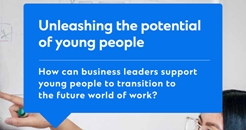 Unleashing the potential of young people
Unleashing the potential of young people
From a paper by Standard Chartered Bank
It is estimated that 65 per cent of children in their fifth year of schooling now, will eventually do jobs that don’t yet exist. In addition, and according to the 2020 World Economic Forum’s Future of Jobs Report, about 50% of all employees will need reskilling by 2025, as adoption of technology increases.
Automation and digital technologies will also disproportionately affect jobs held by women, with the IMF projecting that 11% of jobs currently held by women are at risk of elimination as a result of digital technologies—a higher percentage than for jobs held by men. There is an urgent need for jobs, training and upskilling for current and future employees.
Young people are generally highly willing to reskill, with 75% saying they would consider this, and 72% saying they would take on a second income stream to progress. Just over half would consider setting up a new business.
In a recent Standard Chartered Futuremakers survey of almost 450 young people across 24 countries, 95% said they believed that they would need increased digital and technical skills for their future careers. However, according to Vodafone, 67% of 18–24 year olds don’t believe they have received or are receiving sufficient careers advice for the digital economy.
Young people are, however, very positive about the impact that technology will have on their careers. 94% of respondents to the Standard Chartered Futuremakers survey said they were positive or very positive, and spoke highly of digitisation. Despite this optimism, there are particular concerns in some regions around the world. For example, in sub Saharan Africa, many Africans are not learning the skills they need for 21st century jobs. Sub-Saharan Africa has the lowest literacy rate of any world region and 84% of children and adolescents have not achieved the minimum proficiency for mathematics.
74% of CEOs are concerned about the availability of key skills to grow their businesses. There has been a shift in the most important skills to develop for a future workforce, which are now social and emotional in nature, for example, empathy, creativity, leadership and adaptability.
Business leadership is essential in addressing the skills gap and employers are in the best position to identify the skills they need.
Key findings from the survey of young people:
-
Young people are confident they have some of the transferable skills that their future employers are seeking, but are lacking more of the digital and technical skills they may need. Only 23 per cent thought that they had the necessary technical or vocational skill to help them land their next role.
-
Rates of youth unemployment in many countries are very high, so a key question remains around the barrier to employment that so many young people experience.
-
Young people have very clear views about what they want their future employer, as well as their future working lives, to look like. “Flexible working” came top in terms of what young people were looking for, with 80% saying that they would be happy to travel anywhere for work or it didn’t matter where they were based as they envisaged working remotely. Other key priorities for young people are ongoing job skills training and the opportunity to work for a values and purpose-driven organisation. They placed a good work/life and family balance top of their priorities, as well as the opportunity to have a real impact
-
Despite already having skills that are of value to future employers, young people feel penalised due to their lack of experience or university education. Asked about what skills they felt they already had that would help them in their future careers, young people said their problem-solving skills (77%) and team management skills (58%) would help them advance in their first or next job role.
-
More must be done to connect employers to young people, youth organisations and civil society groups so that there is greater mutual understanding around skills and expectations.
What are the skills they want (or want more of) to help in their future work?:
-
55% IT/digital skills
-
43% Creative skills
-
41% Problem-solving skills
-
41% People management
-
40% A technical or vocational skill
-
35% Critical thinking skills
-
34% Emotional intelligence
Read the full reports here.
If you are an educator, how can you build these into your curriculum? If you are an employer, how can you continually upskill your staff for jobs of the future?
Retweet about this article:
From a paper by Standard Chartered Bank, 06/10/2021